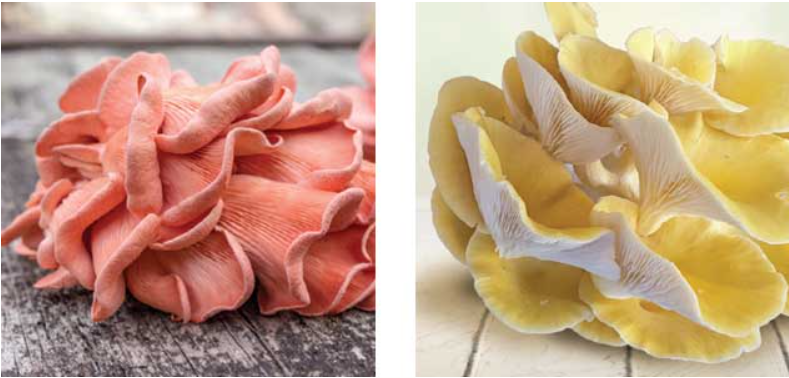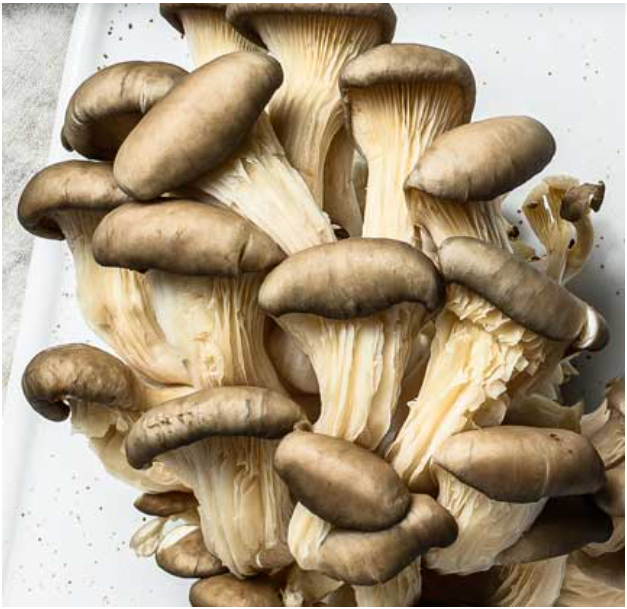Co. Offaly mushroom farmers whose 30-year-old business was devastated almost overnight in 2016, due to the UK’s decision to pursue Brexit, have found light at the end of a different kind of mushroom tunnel.
After three decades’ growing the familiar white button mushroom under the Gorman Mushrooms name, Joe and Dolores Gorman were not ready to walk away for good.
They spotted a niche in the mushroom market here and set about rebuilding their farming enterprise from scratch.
The result was Garryhinch Wood, an organic, ‘exotic’ mushroom offering set up in 2018 on the banks of the River Barrow.
Mushroom industry
Ireland’s mushroom industry is the largest horticultural sector in the country, according to Bord Bia. It has a farm-gate value of €119m, of which approximately 85% is exported to the UK.
Gorman Mushrooms, which operated for three decades and employed 30 people, were heavily dependent on the UK market. When sterling weakened in 2016 following the Brexit vote, their business, effectively, crashed.
“The UK mushroom industry is a 200,000t industry per annum and 65,000t of that are coming from Ireland,” said Joe.
Following the Brexit decision, that market share was held, Joe said, as the bigger mushroom producers in Ireland were able to weather the storm. But many of the smaller companies were not so fortunate.
“The big ones got bigger and the smaller ones died out,” said Joe.
“It was devastating, after spending the guts of 30 years in business, to get wiped out so quickly.
“We were employing about 30 people at that time and, overnight, we had to start making decisions about shutting down the farm. It was very difficult.
“We had no idea what was going to happen after, we were just focused on the closure and limiting any damage that might be done in the process. It took a few months after that to think about what we would do next.”
Exotic mushroom farming
Before the closure of their mushroom enterprise, Joe had observed an increase in imports of various varieties of oddly shaped and colourful mushrooms. Exotics, they were called.
The couple’s ‘what next?’ moment was lit up by the opportunity that these exotic varieties could provide.
Did you know?
Growing mushrooms requires a carbon source and a nitrogen source. The carbon source used for growing Garryhinch Wood exotic mushrooms is a hard wood like oak, birch, beech, ash. The nitrogen source is an organic cereal like oats, bran or soya.
Straw can be used as the carbon source too, but this creates a product with higher water content, a shorter shelf life and less flavour, according to Garryhinch Wood.
They had an empty mushroom farm with all the basic infrastructure in place, surely the exotics were worth exploring?
Joe decided to head to Holland where he completed a course to learn all about these mushrooms.
The market here was small, but they saw an opening in it and potential for growth.
Strategic decisions
So, in 2018, after a two-year break and a lot of research, planning and development, Garryhinch Wood was launched.
Joe and Dolores made a number of strategic decisions – some relating to the global pandemic that hit them last year – to aid the success and the resilience of their new company.

They opted to produce smaller quantities of a higher-end product; they sought and secured various routes to market to minimise their exposure to risk; and they went down the organic route, which they recognised as a growth area.
The rise in popularity of plant-based foods was a trend they also spotted, and they decided to satisfy a strengthening customer demand for environmentally friendly production techniques and packaging solutions.
In doing the legwork to grow exotic mushrooms organically here, they hold the key to the unique substrate recipes required to do so.
“In the first 18 months, Joe worked on developing the protocol of substrate recipes, including the temperature, and time to grow each mushroom,” said Dolores.
Circular economy
Choosing to produce a higer-end product naturally requires higher-cost inputs and this is true for Garryhinch Wood.
“You can grow exotics on straw and you can buy compost (substrate) for €200-€250/t. We decided to go for the wood-based substrate which is €600/t,” said Joe.
“It is more expensive but the quality, texture and taste of mushrooms grown on this particular substrate is far better,” added Dolores.

Garryhinich Wood is a prime example of a circular-economy product.
“Our business takes a waste from another industry – for example, the sawmills – and we use it as a substrate to make a product, and when we have made that product, we put the substrate back into the land again,” said Dolores.
This organic substrate is either spread on or ploughed into fields on Joe and Dolores’s farm.
Exotic mushrooms grown at Garryhinch Wood:
Shiitake;
Grey oyster;
Lions mane;
Forest Nameko;
Pink oyster and yellow oyster;
Maitake;
King oyster;
White beech.
The packaging used is currently recyclable and the company is transitioning to one that will be fully biodegradable.
All of these things add to the credibility of the business, which, as it happens, is the only certified organic exotic mushroom farm in the country. There are several other artisan exotic mushroom producers in the south and north of the island, according to Joe.
Covid-19
Building up the new business has not been without its challenges, requiring a lot of investment of money – the existing tunnels needed to be modified – time and hard work.
Covid-19 was certainly not ideal, but it wasn’t the catastrophe that might have been expected.
“Foodservice died but retail took off like a rocket and by the end of 2020, we were almost back on track,” said Dolores.

“But it was then that we quickly realised that we needed to diversify our routes to market and spread our risk over a number of areas.
“So, we are doing business with the big retailers; as part of the SuperValu Food Academy, we are going in there as a branded product; we have a listing with Dunnes Stores; and we are doing business with high-end retailers like Cavistons, Fallon & Byrne and Avoca.
“We have also started to do business with all the green grocers; with all the organic shops; and we formed a number of relationships with people selling at farmers’ markets too.”
Garryhinch Wood is one of 45 new Irish food producers to have recently completed SuperValu’s Food Academy programme, supported by Bord Bia and the Local Enterprise Offices (LEOs). Dolores and Joe have expressed their thanks for all the support they have received, especially from the Tullamore LEO.
